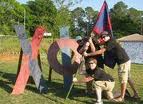These tricks become so would be for the child who it arrives to enter in the world of the fancy; so intensely believing to be reality what it is making, Chateau (1987, p 20), speaking of a child playing of being cleaning of chimneys, while its mother dirige it stops it combing the hair to it, it if move away and cry out, ' ' oh! , Mother, the hair of the cleaner is not so dirty that she goes to make dirty its dedos' '. The child carries through the so serious trick, that she arrives to find to be dirty of dust coming of the chimney, the point to make dirty its mother. important in this period of training, that the adult does not interrupt playing of the child, to prevent possible desestruturaes. The tricks of make-of-count, also form the concept of the reality where the child is inserted. When playing of casinha, it interprets the paper of the mother in the same way that it sees in its reality. The third system of game, Piaget (1978), emphasizes as games of rules, appearing in the child during the 7 to the 11 years of age. The games of rules appear to socialize groups, to develop communication and to inside fulfill the existence of rules, established of the games, among others.
In this phase, the children are making new discoveries, necessitan then of socialization between groups. Didactic tray games, games and corporal games approach the children, through the interactions between them, developing, then the social factor of if holding ahead of the community. 1,3 RECOGNITION OF THE RIGHTS TO PLAY OF THE CHILD IN THE INFANTILE EDUCATION The recognition of the rights of the child and the Infantile Education has generated many speeches throughout the time. Maternal schools, Kindergarten and Day-care centers, had been created to assure, to protect and to instruct ace small children.

Comments are closed.